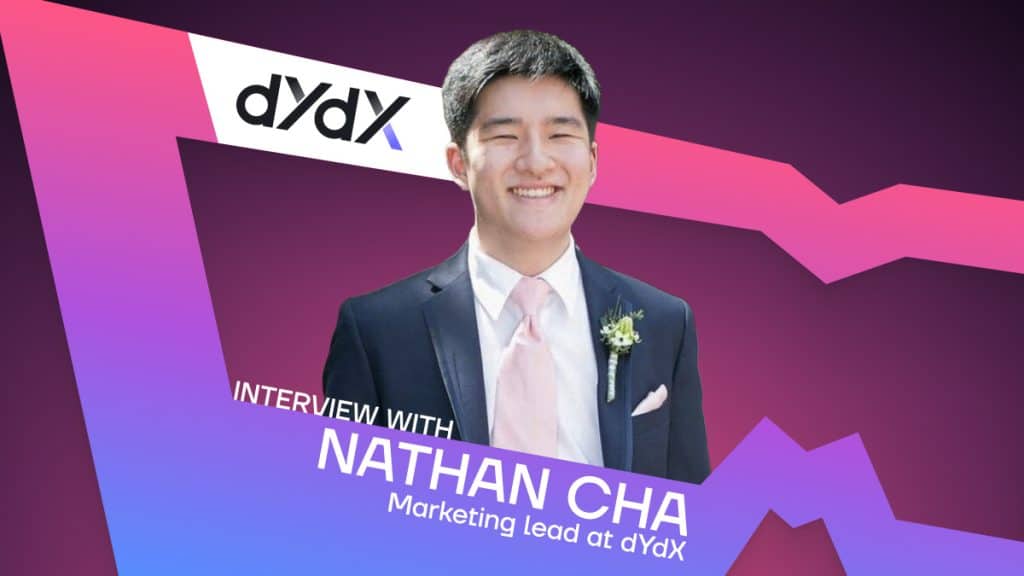dYdX Marketing Lead Nathan Cha Shares Insights on the Future Volume Potential of Decentralized Exchanges


In Brief
Given the recent events in the crypto space, we get Nathan Cha, the marketing lead at DEX dYdX, to shed light on how DEX can become more accessible and why he believes that DEX volume will eventually overtake CEX volume.
Since the collapse of FTX last year, centralized crypto exchanges (CEX) have been mired in controversies and facing one regulatory hurdle after another. Last week, the Securities and Exchange Commission (SEC) cracked down further on crypto with lawsuits against Binance and Coinbase for allegedly offering unregistered securities.

As the regulatory environment surrounding cryptocurrency becomes increasingly complex and uncertain, CEXs are subject to stringent regulations due to their centralized structure, which can vary from country to country. This has resulted in compliance challenges, operational limitations, and potential restrictions on user access, prompting users to flock to decentralized exchanges (DEX).
According to data on Dune Analytics, the weekly DEX volume went from less than 20 billion in Jun 2022 to over 40 billion in Mar 2023. This growth suggests that more and more people are choosing to use DEXs to trade cryptocurrencies. Being decentralized, DEXs often operate in a more permissionless manner, bypassing some of the regulatory obstacles faced by CEXs.
Compared to CEXs, DEXs offer greater privacy and anonymity as they allow for pseudonymous trading, providing users with a greater sense of privacy and control over their personal information. However, liquidity remains a concern as DEX typically has lower trading volumes compared to CEX, which can result in less favorable pricing and slower transaction execution.
Given the recent events in the crypto space, we get Nathan Cha, the marketing lead at DEX dYdX, to shed light on how DEX can become more accessible and why he believes that DEX volume will eventually overtake CEX volume.
Please tell us a bit about your background and your role at dYdX.
My name is Nathan Cha (friends/colleagues call me Nate). Prior to joining dYdX, I worked with a variety of clients, ranging from CPG to TV and Social Media, helping scale ad campaigns, analyze brand performance, and advising clients on overall marketing strategy. I joined dYdX in 2022 to build the marketing program at the protocol from the ground up.
What piqued your interest in the crypto space and where did you first hear about it?
I first heard about Bitcoin when I was in college (early 2010s) and was interested in it purely as an alternative investment outside of the stock market. It wasn’t until I saw the growth in the industry as a whole in the late 2010s that I started to really pay attention. Once I understand how fast-paced and diverse the capabilities of web3/blockchain were, I was hooked. The industry was so interesting. DeFi in particular caught my attention because of how revolutionary the philosophy and technology was in terms of allowing P2P transactions.
What sets dYdX apart from other decentralized derivatives exchanges, and how does it contribute to the continued trend of DEX growth?
dYdX has carved itself a very loyal and active user base that is composed of both institutional and retail traders. DEXs often have issues with their product experience (far worse than those of centralized exchanges) or liquidity issues.
We are proud of offering strong liquidity and the value props of DeFi that centralized exchanges cannot. We are non-custodial and very transparent/auditable, which means that you do not need to worry about counterparty risk or proof of reserves. You can easily audit us in real time while maintaining custody of your assets traded on the platform.
We definitely believe that the future of finance requires decentralization. With all the recent black swan events and implosions over the past year, we firmly believe that the only way forward for the industry is to empower users and remove reliance on centralized entities to make the right/moral decisions. We should rely on the strength of code instead.
The crypto market has experienced significant volatility and cycles. How do you see DEX platforms like dYdX contributing to the stability and maturity of the overall crypto market, particularly in terms of trading liquidity and price discovery mechanisms?
DEX platforms should always offer self-custody. A big issue we noticed during the past year was that contagion spread like wildfire after a series of protocol/exchange implosions. What DEX platforms enable is in periods of extreme volatility, while people may see the value of their portfolio decline in value, they never lose custody of their assets. Whereas with centralized exchanges/protocols, some of those funds seem to vanish overnight. This is essential for the overall crypto market to function and also for people to maintain their faith in the ecosystem.
In terms of liquidity, crypto is unique in that institutions/market makers tend to follow wherever retail flow exists. So the responsibility of DEXs is to attract more retail usage by providing a product that is attractive to traders and offers them the capabilities that they require to trade. With the transition to v4, dYdX will increase throughput/scalability to allow for trading on an increased number of markets, but will also become increasingly transparent with the order book moving on-chain.
The accessibility and user experience of DEX platforms have improved over time, but there is still a perception that they are more complex compared to centralized exchanges. How is dYdX working to bridge this usability gap and make DEX trading more accessible to a broader range of users, including novices?
CEXs historically have been more favorable as an onramp for retail traders into crypto. DEXs have been more complex, with the need to use noncustodial wallets, retain private keys, and the education required to onboard onto platforms.
That being said, DEXs also increase accessibility and privacy across the board because they do not require KYC from retail users. There have also been integrations with fiat on ramps that make depositing assets much simpler for newer users that may not already possess spot crypto assets.
However, dYdX offers perpetuals trading (a class of derivatives). The range of users tends to be more sophisticated. Realistically, a novice investor looking to get some exposure to Bitcoin or Ethereum will not trade on the dYdX platform since they would just want to buy some spot assets to get their feet wet. For dYdX, it is more important to cater to those “pro-retail” traders and institutions who want advanced trading capabilities, a diverse selection of markets, and a stellar product experience. That is how DEX trading becomes more accessible.
Centralized exchanges (CEX) have traditionally dominated the crypto trading landscape. How do you perceive the long-term competition and synergy between DEX platforms like dYdX and centralized exchanges, and what advantages do DEXs offer that may attract traders away from CEXs?
Antonio Juliano, our CEO, often says that the timeline for DEXs to eventually see the same amount of volume as centralized exchanges is roughly 5-10 years. We are still early in the journey of user education and building solid products. While the technology has been growing in quality exponentially over the years and many retail users are increasingly aware of the values of DeFi, we are not yet near the point of mass adoption.
Personally, I do see a world in which CEXs and DEXs coexist as some people will not care to go through the process of retaining their private keys and needing their own personal wallets to trade/invest; I also believe that DEX volume will eventually overtake CEX volume.
Self-custody of assets and the transparency that comes with decentralized finance can never be replicated by centralized exchanges or entities because, by virtue of being centralized, too much information is hidden from external stakeholders or users of centralized services.
We’ve seen this story play out far too many times – an exchange goes under and user funds seemingly evaporate overnight, but the reality was that fraud or misuse of funds was happening behind the scenes for extended periods of time. Even if dYdX Trading was to go under tomorrow, user funds would still be protected on the platform because it never holds custody of user funds.
User trust and security are crucial for any financial platform. Could you elaborate on the security measures implemented by dYdX?
dYdX is very confident that the code and product we have built are extremely secure/safe. We are battle tested and have managed to run an exchange that averages a billion in trading volume per day without any major hacks or issues.
We also are very transparent because people can audit the dYdX smart contract at any time by going on etherscan. With v4, we are also open-sourcing the protocol so that people can readily see information about our tech stack and product. If people want to build on top of our open-source software or perform due diligence on it, they will be able to do so very easily.
dYdX has recently taken steps to move from Ethereum to Cosmos. Besides faster transactions and the ability to customize the blockchain to suit the exchange’s needs, what else does Cosmos bring to the scalability of the platform?
Everything from increased throughput to transparency and community ownership or lower fees made this the best decision possible. From nearly every angle, there were strong benefits to building a standalone blockchain on Cosmos.
I would encourage anyone interested to read through this blog post, as it dives into the rationale for moving to Cosmos and building a standalone blockchain in great detail.
What’s your view on the current state of the crypto market? Where do you see it going in the next five years?
The crypto market has weathered an unprecedented bear market over the last year due to several black swan events, but what we’ve seen is that the junk protocols and projects that do not provide real value to users have started to wash away. The market has shown strong resilience, as we’ve seen trading volumes recover from the lowest points of the bear market, and increased institutional involvement in the industry.
Over the next five years, I foresee that the protocols that were focused on building the bear market and improving their products will see significant growth. I also predict that DeFi will continue to grow in popularity and usage as users continue to become more educated about the crypto industry and ecosystem. I feel very optimistic about where the market/industry is heading.
Read more:
- Antonio Juliano, Founder of dYdX
- What are decentralized exchanges: How does it work? (2023)
- Looking to trade on a decentralized exchange but not sure where to start? Here’s a 2023 beginner’s guide
Disclaimer
In line with the Trust Project guidelines, please note that the information provided on this page is not intended to be and should not be interpreted as legal, tax, investment, financial, or any other form of advice. It is important to only invest what you can afford to lose and to seek independent financial advice if you have any doubts. For further information, we suggest referring to the terms and conditions as well as the help and support pages provided by the issuer or advertiser. MetaversePost is committed to accurate, unbiased reporting, but market conditions are subject to change without notice.
About The Author
Cindy is a journalist at Metaverse Post, covering topics related to web3, NFT, metaverse and AI, with a focus on interviews with Web3 industry players. She has spoken to over 30 C-level execs and counting, bringing their valuable insights to readers. Originally from Singapore, Cindy is now based in Tbilisi, Georgia. She holds a Bachelor's degree in Communications & Media Studies from the University of South Australia and has a decade of experience in journalism and writing. Get in touch with her via [email protected] with press pitches, announcements and interview opportunities.
More articles

Cindy is a journalist at Metaverse Post, covering topics related to web3, NFT, metaverse and AI, with a focus on interviews with Web3 industry players. She has spoken to over 30 C-level execs and counting, bringing their valuable insights to readers. Originally from Singapore, Cindy is now based in Tbilisi, Georgia. She holds a Bachelor's degree in Communications & Media Studies from the University of South Australia and has a decade of experience in journalism and writing. Get in touch with her via [email protected] with press pitches, announcements and interview opportunities.

















































